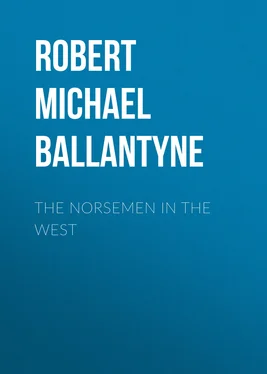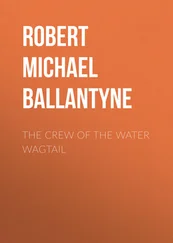Robert Michael Ballantyne - The Norsemen in the West
Здесь есть возможность читать онлайн «Robert Michael Ballantyne - The Norsemen in the West» — ознакомительный отрывок электронной книги совершенно бесплатно, а после прочтения отрывка купить полную версию. В некоторых случаях можно слушать аудио, скачать через торрент в формате fb2 и присутствует краткое содержание. Жанр: Детские приключения, literature_19, foreign_antique, foreign_prose, foreign_children, на английском языке. Описание произведения, (предисловие) а так же отзывы посетителей доступны на портале библиотеки ЛибКат.
- Название:The Norsemen in the West
- Автор:
- Жанр:
- Год:неизвестен
- ISBN:нет данных
- Рейтинг книги:5 / 5. Голосов: 1
-
Избранное:Добавить в избранное
- Отзывы:
-
Ваша оценка:
- 100
- 1
- 2
- 3
- 4
- 5
The Norsemen in the West: краткое содержание, описание и аннотация
Предлагаем к чтению аннотацию, описание, краткое содержание или предисловие (зависит от того, что написал сам автор книги «The Norsemen in the West»). Если вы не нашли необходимую информацию о книге — напишите в комментариях, мы постараемся отыскать её.
The Norsemen in the West — читать онлайн ознакомительный отрывок
Ниже представлен текст книги, разбитый по страницам. Система сохранения места последней прочитанной страницы, позволяет с удобством читать онлайн бесплатно книгу «The Norsemen in the West», без необходимости каждый раз заново искать на чём Вы остановились. Поставьте закладку, и сможете в любой момент перейти на страницу, на которой закончили чтение.
Интервал:
Закладка:
“That’s true,” observed Krake, who was an Icelander.
“Oh!” exclaimed Tyrker, with a peculiar twist of his ugly countenance, “Turkey is the land that beats all others completely.”
At this there was a general laugh.
“Why, how can that be?” cried Swend, who was inclined to take up the question rather hotly. “What have you to boast of in Turkey?”
“Eh! What have we not , is the question. What shall I say? Ha! we have grapes there; and we do make such a drink of them—Oh!—”
Here Tyrker screwed his face and figure into what was meant for a condition of ecstasy.
“’Twere well that they had no grapes there, Tyrker,” said Biarne, “for if all be true that Karlsefin tells us of that drink, they would be better without it.”
“I wish I had it!” remarked Tyrker, pathetically.
“Well, it is said that we shall find grapes in Vinland,” observed Swend, “and as we are told there is everything else there that man can desire, our new country will beat all the others put together,—so hurrah for Vinland!”
The cheer was given with right good-will, and then Tyrker reminded Krake of his promise to sing a song. Krake, whose jovial spirits made him always ready for anything, at once struck up to a rattling ditty:—
One night when one o’ the Irish Kings
Was sleeping in his bed,
Six Danish Kings—so Sigvat sings—
Came an’ cut off his head.
The Irish boys they heard the noise,
And flocked unto the shore;
They caught the kings, and put out their eyes,
And left them in their gore.
Chorus —Oh! this is the way we served the kings,
An’ spoiled their pleasure, the dirty things,
When they came to harry and flap their wings
Upon the Irish shore-ore,
Upon the Irish shore.
Next year the Danes took terrible pains
To wipe that stain away;
They came with a fleet, their foes to meet,
Across the stormy say.
Each Irish carl great stones did hurl
In such a mighty rain,
The Danes went down, with a horrible stoun,
An’ never came up again!
Oh! this is the way, etcetera.
The men were still laughing and applauding Krake’s song when Olaf, who chanced to look over the bow of the vessel, started up and shouted “Land, ho!” in a shrill voice, that rang through the whole ship.
Instantly, the poop and forecastle were crowded, and there, on the starboard bow, they saw a faint blue line of hills far away on the horizon. Olaf got full credit for having discovered the land first on this occasion; and for some time everything else was forgotten in speculations as to what this new land would turn out to be; but the wind, which had been getting lighter every hour that day, died away almost to a calm, so that, as there was no prospect of reaching the land for some hours, the men gradually fell back to their old places and occupation.
“Now, then, Krake,” said Tyrker, “tell us the story about that king you were talking of the other day; which was it? Harald—”
“Ay, King Harald,” said Krake, “and how he came to get the name of Greyskin. Well, you must know that it’s not many years ago since my father, Sigurd, was a trader between Iceland and Norway. He went to other places too, sometimes—and once to Ireland, on which occasion it was that I was taken prisoner and kept so long in the country, that I became an Irishman. But after escaping and getting home I managed to change back into an Icelander, as ye may see! Well, in my father’s younger days, before I was born—which was a pity! for he needed help sorely at that time, and I would have been just the man to turn myself handy to any sort of work; however, it wasn’t my fault,—in his younger days, my father one summer went over from Iceland to Norway,—his ship loaded till she could hardly float, with skins and peltry, chiefly grey wolves. It’s my opinion that the reason she didn’t go down was that they had packed her so tight there was no room for the water to get in and sink her. Anyway, over the sea she went and got safe to Norway.
“At that time King Harald, one of the sons of Eric, reigned in Norway, after the death of King Hakon the Good. He and my father were great friends, but they had not met for some time; and not since Harald had come to his dignity. My father sailed to Hardanger, intending to dispose of his pelts there if he could. Now, King Harald generally had his seat in Hordaland and Bogaland, and some of his brothers were usually with him; but it chanced that year that they went to Hardanger, so my father and the king met, and had great doings, drinking beer and talking about old times when they were boys together.
“My father then went to the place where the greatest number of people were met in the fiord, but nobody would buy any of his skins. He couldn’t understand this at all, and was very much annoyed at it, and at night when he was at supper with the king he tells him about it. The king was in a funny humour that night. He had dashed his beard with beer to a great extent, and laughed heartily sometimes without my father being able to see what was the joke. But my father was a knowing man. He knew well enough that people are sometimes given to hearty laughter without troubling themselves much about the joke—especially when they are beery,—so he laughed too, out of friendliness, and was very sociable.
“When my father went away the king promised to pay him a visit on board of his ship next day, which he did, sure enough; and my father took care to let it be known that he was coming, so there was no lack of the principal people thereabouts. They had all come down together, by the merest chance, to the place where the ship lay, just to enjoy the fresh air—being fresher there that day than at most other places on the fiord, no doubt!
“King Harald came with a fully-manned boat, and a number of followers. He was very condescending and full of fun, as he had been the night before. When he was going away he looked at the skins, and said to my father, ‘Wilt thou give me a present of one of these wolf-skins?’
“‘Willingly,’ says my father, ‘and as many more as you please.’
“On this, the king wrapped himself up in a wolf-skin and went back to his boat and rowed away. Immediately after, all the boats in his suite came alongside and looked at the wolf-skins with great admiration, and every man bought just such another wolf-skin as the king had got. In a few days so many people came to buy skins, that not half of them could be served with what they wanted, and the upshot was that my father’s vessel was cleared out down to the keel, and thereafter the king went, as you know, by the name of Harald Greyskin.
“But here we are, comrades,” continued Krake, rising, “drawing near to the land,—I’ll have a look at it.”
The country off which they soon cast anchor was flat and overgrown with wood; and the strand far around consisted of white sand, and was very low towards the sea. Biarne said that it was the country to which Leif had given the name of Markland, because it was well-wooded; they therefore went ashore in the small boat, but finding nothing in particular to attract their interest, they soon returned on board and again put to sea with an onshore wind from the north-east. (Some antiquaries appear to be of opinion that Helloland must have been Newfoundland, and Markland some part of Nova Scotia.)
For two days they continued their voyage with the same wind, and then made land for the third time and found it to be an island. It was blowing hard at the time, and Biarne advised that they should take shelter there and wait for good weather. This they did, and, as before, a few of them landed to explore the country, but there was not much to take note of. Little Olaf, who was one of the explorers, observed dew on the grass, and, remembering that Leif had said that the dew on one of the islands which he met with was sweet , he shook some into the hollow of his hand and tasted it, but looked disappointed.
Читать дальшеИнтервал:
Закладка:
Похожие книги на «The Norsemen in the West»
Представляем Вашему вниманию похожие книги на «The Norsemen in the West» списком для выбора. Мы отобрали схожую по названию и смыслу литературу в надежде предоставить читателям больше вариантов отыскать новые, интересные, ещё непрочитанные произведения.
Обсуждение, отзывы о книге «The Norsemen in the West» и просто собственные мнения читателей. Оставьте ваши комментарии, напишите, что Вы думаете о произведении, его смысле или главных героях. Укажите что конкретно понравилось, а что нет, и почему Вы так считаете.












